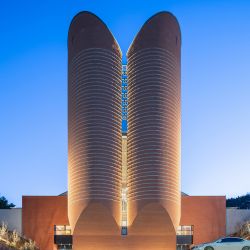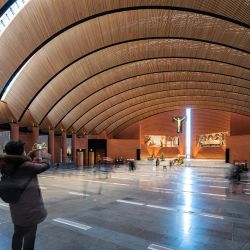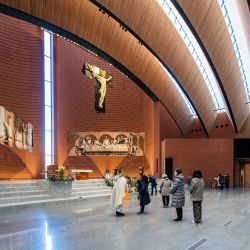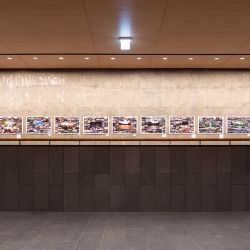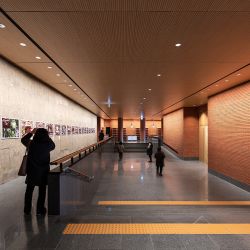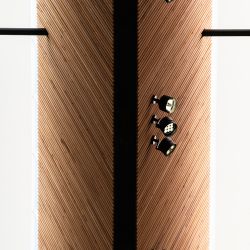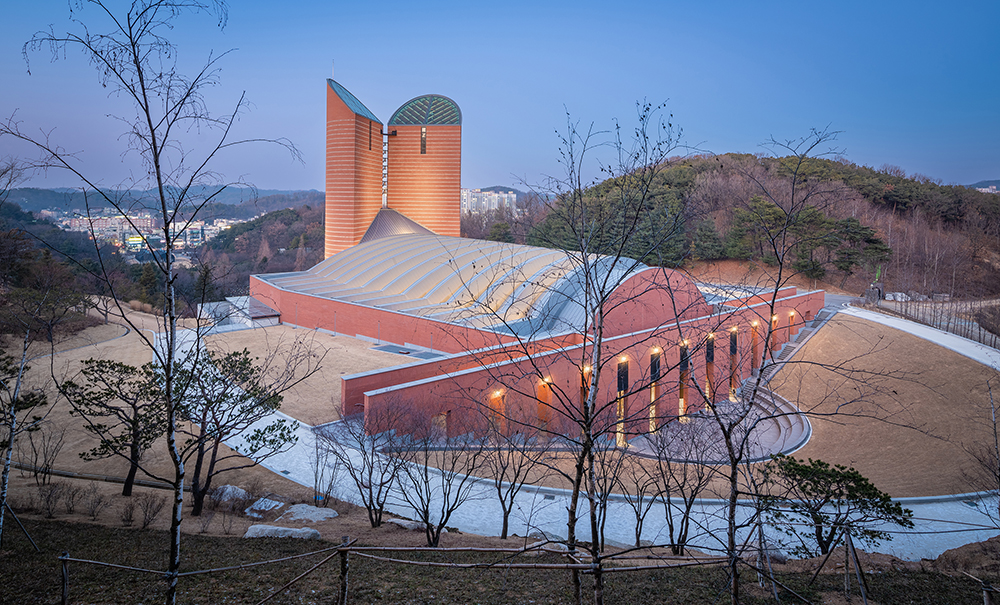
Download this article:
The Shrine of Our Lady of the Rosary of Namyang, also known as ‘Rosary Hill’, is considered a site of Catholic martyrdom, memorializing the Great Byungin Persecution of 1866. To memorialize their martyrdom as proof of their faith, Namyang was designated as a Holy Site on October 7, 1991. This cathedral, built in hopes of inter-Korean unification and peace, was designed by world-renowned architect Mario Botta. South Korea's leading lighting design practice Bitzro & partners were commissioned with lighting design of the cathedral. ERCO outdoor and indoor luminaires provide sustainable lighting to increase the quality of stay and create high visual comfort for visitors.
In a vast green hilly area south of the city, the cathedral is built in a small valley between the hills, incorporating it as part of the site. The presence of the cross is deliberately kept low-key, engraved only at the top of the tower. The building intention of the cathedral is not just for Catholic mass and believers, but to act as a community park for the residents. It aims to revive the tradition of ancient Basilica, a large public building with multiple functions and a place for public assembly. On weekends, you can see families having picnics at the surrounding park.
Energy efficient wallwashing for good orientation
As visitors are led up the hill, they are greeted by two brick-cladded towers. Lit up by Lightscan outdoor projectors, the towers reach up to the skies like a beacon for hope and peace. To enter the cathedral, visitors are brought up close to the towers, entering from the two large entrances on the side of the towers. Walking through a corridor of concrete and brick cladded wall, the area is lit up by Quintessence wallwashers (LED 16W, 3000K). Vertical illuminance in form of wallwashing can light up a space with lesser light fixtures while creating sufficient ambient lighting for wayfinding. Using lesser light fixtures also reduces the purchasing and operational cost, creating a more energy efficient system in the long run. It can also define and enhance the architectural elements of the space.
The play of light and shadows
As the visitors make their way to the main hall of the cathedral, they are greeted by a large space. The curved roof is made with maple wood louvres, with gaps of skylights in-between for natural light to shine in. The light changes across different seasons and time of the day, creating a harmonious link between man and nature. The gap between the two towers also guides a beam of natural light into the space, attracting visitor’s attention to the main altar.
Visitors are led to the towers as they climb up the hill and enter the cathedral to the main hall. On a sunny day, light shines down to the altar through the skylight above the 41m high tower. Looking up the towers, the rectangular pattern of the skylight creates a brilliant play of light and shadow along the curved wall of the towers. A mix of Parscan spotlights with spot and narrow spot light distribution was installed on the wooden louvres. The luminaires are aimed at the crucifix and the two large format artworks at the base of the towers, accenting them in the space and grabbing the attention of the visitors as they make their way inwards to the main altar.
Light is only used where it’s needed and where it’s seen. Parscan spotlights offer best quality of light thanks to Spherolit lenses. They generate more precise and homogeneous light beams without spill light. Despite the height of more than 10m, the spotlights illuminate the two artworks efficiently and effectively, creating an even lighting with high visual comfort.
The change of light over time creates various expressions along with the movement of space, while making the night time scenery holy with artificial light. Biztro and partners have made great efforts for a long time to make the more human-like image of Jesus natural and awe-inspiring through the light. The transparent light shining through the eyes of Jesus presented at the end also symbolizes the light of warm love with full of humanity that is looking at us living in the present.
More energy savings with sustainable lighting and architecture
Other than providing a natural light source and acting as a landmark for the area, the towers also provide ventilation and maintain the indoor temperature. In addition, air tunnels buried underground on both sides will inject cool air in summer and warm outside air in winter. These air tunnels will help save about 40% of the heating and air-conditioning energy used in cathedrals and minimize energy consumption by using an eco-friendly geothermal system.
The more light is emitted, the higher the current is needed and the temperature increases accordingly as well. Such high temperature overtime leads to rapid degradation of the LED modules, thus needing more replacements. ERCO develops lighting technology, electronics and thermal managements in-house. The luminaires provide high efficiency light (in lumens per watt) and maximum effective light (in lux per watt), because special lenses direct light only where it’s needed and human perception requires it. With this given, the amount of energy and luminaires needed could be reduced. Nevertheless, enough light in the large space areas with high ceilings could be provided perfectly.
For further information about the sustainable lighting strategy, see: www.erco.com/greenology.
Project data
Project: The Shrine of Our Lady of the Rosary of Namyang, Seoul / South Korea
Architecture: Mario Botta Architetti, Mendrisio / Switzerland, HnSa Architects & Designers, Seoul / South Korea
Lighting design: Bitzro & partners, Seoul / South Korea
ERCO parnter: MICO
Photography: Efraín Méndez, Seoul / South Korea
Products: Lightscan, Kona, Parscan, Quintessence
Photo credits: © ERCO GmbH, www.erco.com, Photography: Efraín Méndez
About ERCO
ERCO is an international specialist for high-quality and digital architectural lighting. The family-owned company, founded in 1934, operates globally in 55 countries with independent sales organisations and partners.
ERCO understands light as the fourth dimension of architecture – and thus as an integral part of sustainable building. Light is the contribution to making society and architecture better and, at the same time, preserving our environment. ERCO Greenology® – the corporate strategy for sustainable lighting – combines ecological responsibility with technological expertise.
At the light factory in Lüdenscheid, Germany, ERCO develops, designs and manufactures luminaires with a focus on photometric optics, electronics and sustainable design. The lighting tools are developed in close collaboration with architects, lighting designers and electrical designers. They are used primarily in the following applications: Work and Culture, Community and Public/Outdoor, Contemplation, Living, Shop and Hospitality. ERCO lighting experts support designers worldwide in transforming their projects into reality with highly precise, efficient and sustainable lighting solutions.
If you require any further information on ERCO or image material, please visit us at www.erco.com/press. We can also provide you with material on projects worldwide for your media coverage.
Relevant image material
© ERCO GmbH, www.erco.com, Photography: Efraín Méndez
© ERCO GmbH, www.erco.com, Photography: Efraín Méndez
© ERCO GmbH, www.erco.com, Photography: Efraín Méndez
© ERCO GmbH, www.erco.com, Photography: Efraín Méndez
© ERCO GmbH, www.erco.com, Photography: Efraín Méndez
© ERCO GmbH, www.erco.com, Photography: Efraín Méndez
